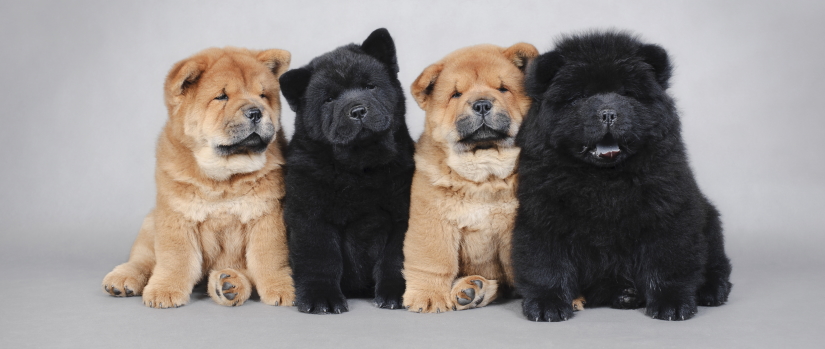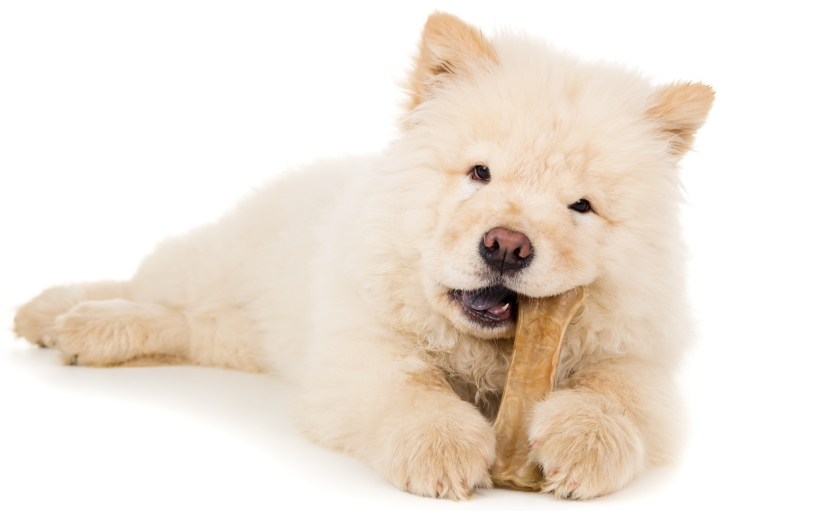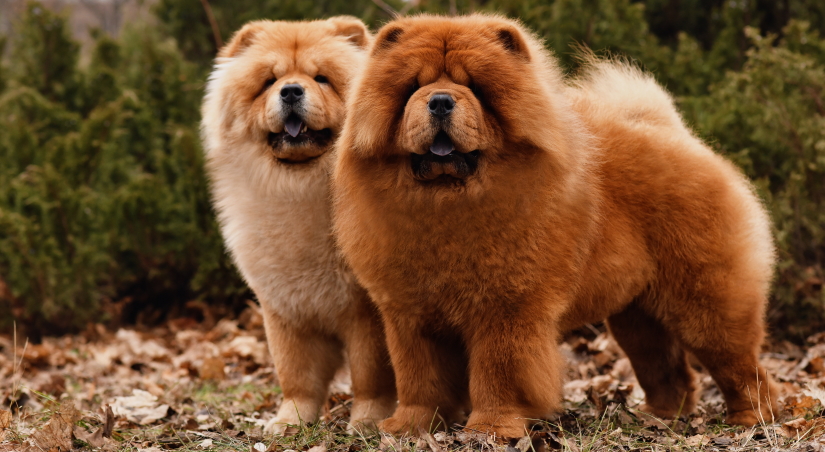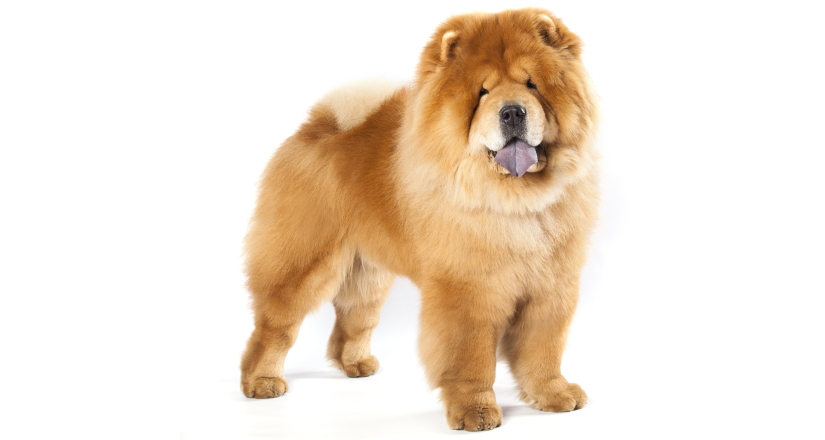The Chow Chow is also called the Lang Gou (wolf-dog), or the Xiong Gou (bear dog). This breed originated from China. It is believed that the Chow’s ancestors are traceable as far back as the Han Dynasty.
Breeders think that the Chow is a mix of the Tibetan Mastiff and Samoyed. The Chow belongs to the UKC, Northern Group, and AKC’s Non-Sporting Group.




Non-Sporting
Brief History
The Chow was first used as a hunting dog breed for pheasant and partridge. The Chow Chow’s name comes from the pidgin-English slang word that sailors describe cargo, Chow- Chow. Evidence goes back to show that the Chow has spitz-type dog breed relatives from the Norwegian Elkhound to the Pomeranian. This dog breed was used for companionship with nobility.
Over the past centuries, the Chow Chow were also used as guardian dogs and for hunting and hauling. Their ancestors were also a food source and nicknamed the “Edible Dog.” By the 1820s, the Chow Chow could be seen at Chinese Zoos and were called “The Wild Dogs of China.” The Chow breed arrived in the U.S in the 1890s and was registered with the AKC in 1903.
Physical Description

The Chow is a medium-sized, well-built dog breed. It is sturdy, squarely built, and powerful. This dog breed has prick ears with rounded tips and a disdainful expression with a broad head and a short muzzle. The eyes are almond-shaped and dark brown. The eyes are also deeply set, offering the Chow shortened peripheral vision.
The Chow has a tongue that’s bluish with a large and black nose. Blue Chows will have a slate-colored tongue. The tail is high and close to the body at all times. The shoulders are strong and well-muscled. This dog breed is double-coated, with the outer coat being smooth or rough. The rough coat tends to be longer, abundant, and straight. The undercoat is soft and wooly.
There is a thick ruff around the head and neck. This frames the head. The tail is plumed. There are zero featherings on either the tail or leg parts. The coat color is usually red, black, blue, cinnamon, or cream. The movement is straight, never lumbering. This breed is agile, brief, quick, and powerful.
Temperament
The Chow Chow is an aloof dog breed that is also dignified. This dog breed is very independent and intelligent. This dog breed is friendly and loyal to family. The Chow Chow does well with plenty of socialization and positive dog training starting at puppyhood. Although the Chow Chow is reserved with strangers, it should not be aggressive.
The Chow Chow is not good with other dogs and animals. The Chow does best with lots of exercises and a fenced yard. The Chow may be challenging to train due to being stubborn. It is also territorial, so Chow’s parents need to make every effort to start socialization during the first four weeks of puppyhood.
Special Needs
This somewhat aloof yet very agile dog breed does well with plenty of off-leash exercises. That said, the Chow is sensitive, active, and enjoys short hikes.
The best way of training this dog breed is to include plenty of games and long walks. It does well with apartment city living, as it does not require excessive exercise. The Chow may be prone to excessive barking.
Hot and humid climates can be lethal to this dog breed. The Chow also needs to be kept indoors. Chow Chows are also sensitive to frigid temperatures. All methods of flight and travel need to be avoided for this dog breed during high temperatures. If traveling by air, the Chow needs to go in a cabin.
Possible Health Concerns
The Chow is a very healthy and active dog breed that may be prone to a few health issues: These are as follows:
- Hip Dysplasia: development of the hip joint in large dog breeds like the Chow. It is generally characterized by a loose joint and then degenerative joint disease. The Chow should be fed a high-quality diet that is geared towards their life stage.
- Entropion: The eyelids roll inward with entropion, and the eyelashes rub against the cornea. It is a severe and irritating condition for dogs. This is a heritable disorder that your veterinarian can surgically correct.
- Anesthesia Sensitivity: This breed may have a difficult time tolerating anesthesia. Consult with your veterinarian before surgery or dental cleaning.
- Heat & Cold Sensitivity: Chows need to be careful of extreme temps, most especially heat.
- Bloat: Often occurs in larger breeds with narrow chests like the Chow. Signs may include dry retching, vomiting, pacing, heavy panting, and a swollen stomach.
- Persistent Pupillary Membranes (PPMs): These are remnants of a fetal structure called the pupillary membrane. This is hereditary in Chows. Blindness is associated with PPM’s. Consult with your veterinarian for advice.
Exercise

The Chow needs regular exercise every day to stay fit and to not pick up weight and to build and maintain strong back muscles and keep healthy. Chows do not require excessive exercise. This alert and active dog breed also enjoy playing with interactive dog toys for mental stimulation.
All high-impact exercise needs to be avoided. The Chow needs to avoid exercise during hot temperatures. Additionally, the Chow needs to be indoors during the hot summer months, and should only exercise during the early morning or evening hours, to keep cool and comfortable. Daily walks a few times a day keep this dog breed content.
The Chow most enjoys family activities with their dog parents. Dog park playdates with other dogs and trips to the dog beach help relax the Chow. Keep in mind that this dog breed can be aggressive with other dogs, so positive training and socialization must be ongoing to ensure that this breed is fine with other dogs, people, and children. That said, it’s never too late to start with either. Dogs need to be socialized. They need other canine friends, canine playdates for dog park meets, and pooch birthday parties!
Nutrition
All dog breeds, regardless of size and age, need to be fed a high-quality diet. With so many high-quality dog food brands out there today, choosing the right one for your Chow is not only fun but easy.
Chow dog parents should never underestimate the importance of healthy, high-quality, balanced nutrition for their dogs. Start by you assessing your Chow’s activity level, age, breed, and any medical conditions that he or she may be prone to when selecting the best dog food.
With options like bison, duck, venison, quail, wild boar, lamb, salmon, and turkey, dog food brands offer unique and unusual protein sources that are healthy for active dogs. Consult with your veterinarian if your Chow has possible food allergies. Always check his skin for allergies.
Some dog food formulas contain probiotics, salmon oil, and guaranteed calcium and phosphorus levels to help support your Chow pup’s teeth and bones’ healthy development.
For older dogs, look for recipes that offer glucosamine and chondroitin for hip and joint wellness. The protein options can include turkey and chickpea stew, salmon and chickpea stew, and a chicken with chickpea with no artificial flavors, corn, or soy in the ingredients.
- There is no “best diet.” Dogs are individuals. A diet that works for one dog may not be the best for another. Age, energy level, and individual medical concerns play a large role for each dog.
- The recommended guidelines on bags often contain more calories than dogs need. Unless your dog is a very energetic (and intact) animal, veterinarians will usually recommend feeding the lower end of the recommendation.
- Feed a complete and balanced food for the appropriate life stage of your Chow. Always consult with your veterinarian if your Chow develops food allergies and needs a change of diet. Some Chow’s may have special needs like a weakened immune system. Adding supplements is always a good idea.
Grooming

The Chow has a profuse double coat that needs regular maintenance. This dog breed needs to have daily grooming. Chows that enjoy playing outside in muddy conditions will need to be bathed as needed. Always check your Chow’s coat for fleas and ticks, and consult with your veterinarian to the safest flea and tick control products.
Eyes need to be wiped daily, and ears should be checked for sensitivity and also cleaned weekly. The Chow’s coat gets matted very easily. Chow dog parents may visit a professional dog groomer for clipping. This also ensures that this breed does not overheat. When home- bathing, it’s best to use a cool dryer to dry the Chow.
Daily dental brushing is a must to prevent the development of plaque. Chow parents can help with canine dental care by providing “flossie- style” dental cleaning bones. Both regular dental brushing in combination with professional dental cleanings reduces the risk of gingivitis and periodontal disease.
This will also prevent extraction in the long run. Daily grooming is essential for dogs like the Chow to prevent matting and irritation of the skin. Moist and sensitive skin conditions exist beneath the matt. This leaves the skin open to bacterial infections and even parasitic infections. Consult with your veterinarian if your Chow has a skin condition. These get worse overnight and become harder to treat!
Adopting a Chow
Just like people, dogs need time to adjust to their new homes after adoption. There are many good books available on the subject of canine behavior and adoption. Your local shelter will also be too happy to provide you with a list of positive dog trainers. In general, Chow parents need to ensure that both socialization and positive dog training continue throughout their Chow’s life. It must be a lifetime commitment! This will provide a happy, well-balanced Chow that enjoys being around people and other dogs.
Understanding the nature of your Chow’s behavioral problems is essential in developing that unique human, canine bond. After adoption, one needs to focus on veterinary health care and working through behavioral issues.
Many health issues are closely linked to behavioral problems. Consult with your veterinarian for the very best advice. Take the time to understand your Chow! Exercising together helps with bonding and easing canine depression.
Keeping your Chow happy and healthy must be a priority. This wonderful breed deserves the very best!
Chow Chow Breeders in the USA
Kelin Chows (Florida)
- Address
- Miami, FL
- Website
- www.facebook.com/kelinchows/
- Phone
- (305) 2059678
- kelin@bellsouth.net
Wink Chows (Colorado)
- Address
- Elizabeth, CO
- Website
- www.winkchows.com
- Phone
- (303) 6461119
- winkchows@hotmail.com
Morocco Chows (Texas)
- Address
- Harlingen, TX
- Website
- www.facebook.com/MoroccoChows
- Phone
- (956) 3659559
- moroccochows@yahoo.com
Dreamland Kennel (Texas)
- Address
- Lubbock, TX
- Website
- dreamlandkennel.com
- Phone
- (806) 2342230
- dreamlandkennel@aol.com
Regal Chow Chows (Texas)
- Address
- Kerrville, TX
- Website
- www.regalchowchows.com
- Phone
- (541) 6397820
Canine Protection Connection (Indiana)
- Address
- Nappanee, IN
- Website
- www.canineprotectionconnection.com
- Phone
- (574) 8001365
- canineprotectionconnection@hotmail.com
Camelot Chow Chow’s (Louisiana)
- Address
- Baton Rouge, LA
- Website
- www.camelotchowchows.com
- Phone
- (225) 6205722
Seattle Chow Chows (Washington State)
- Address
- Renton, WA
- Website
- www.seattlechowchows.com
- Phone
- (425) 5533727
- quinnatate101@gmail.com
Orchids Chow Chows (Oklahoma)
- Address
- Sapulpa, OK
- Website
- www.facebook.com/orchidschowchows/
- Phone
- (918) 6308647
Forestway Chows (Michigan)
- Address
- Monroe, MI
- Website
- www.forestwaychows.com
- Phone
- (734) 5295694
- chows@dundee.net
Chow Chow Breeders in the Canada
ChowRidge
- Address
- Cayley, Alberta
- Website
- www.petresortandspaw.net/chowridge.html
- Phone
- (403) 3952211
- chowridge@hotmail.ca
Mi-Pao
- Address
- Waterdown, Ontario
- Website
- mipao.com
- Phone
- (905) 3351712
- mipao@sympatico.ca
Dragonslayer
- Address
- Haley Station, Ontario
- Website
- www.dragonslayertaichows.com
- Phone
- (613) 4333179
- chowchows1@hotmail.com
Bearcrest Chows
- Address
- Thunder Bay, Ontario
- Website
- www.bearcrestchows.com
- Phone
- (204) 4307257
- bearcrestchows@gmail.com
